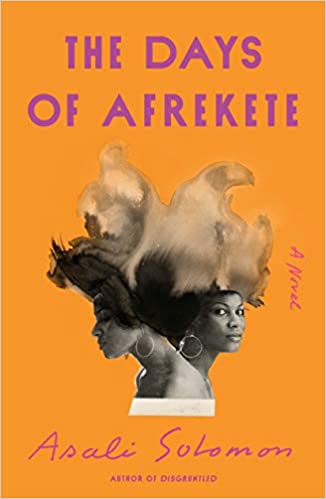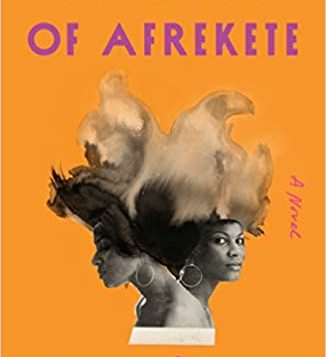 THE DAYS OF AFREKETE: A Novel
THE DAYS OF AFREKETE: A Novel
by Asali Solomon
Farrar, Straus and Giroux. 189 pages, $26.
THE PLOT of The Days of Afrekete is set in motion on page one when the reader learns that the husband of one of the main characters is facing jail time. The stage is fleshed out a couple of pages later as the narrator observes: “Liselle’s forty-one years of research suggested that no matter how distant, abusive, judgmental, unloving, and useless one’s mother was, one called her when things fell apart.” The snappy immediacy of this beginning continues through much of this short novel, provocatively linked by critics with such literary masterpieces as Virginia Woolf’s Mrs. Dalloway and Toni Morrison’s Sula. The novel’s title invokes Afrekete, a figure in Audre Lorde’s woman-centered biomythography Zami and provides a secret code word of alarm between the two women lovers whose college romance haunts the narrative.
The setting is Obama-era Philadelphia, and structure of the novel is provided by a racially mixed dinner party hosted by Liselle Belmont Anderson and her lawyer husband Winn to thank supporters of his lost bid for state representative.
The novel provides a vehicle for a conversation about African-American literature between Selena and Liselle, who met in a Black women writers class, where they formed an intimate bond with such writers as Toni Morrison, Audre Lorde, and Franz Fanon. A key theme is triggered by Liselle’s dismay at receiving a B– on a Zami paper that argued for the endurance of women’s relationships, an essay criticized by the African-American woman professor as “fantasy, not literary analysis.” Though the younger Liselle resists the professor’s claims, it may be that the events of the novel affirm them—or maybe not. The ambiguous ending may leave readers hoping for a sequel.
To be sure, the irreverent tone and biting social commentary of Days of Afrekete reveal Asali Solomon to be a writer of great skill, and the fast pace encourages readers to fly right through. The device of the single-day novel is associated with iconic Modernist novels by Virginia Woolf and James Joyce, and Solomon makes good use of it. Also of note is that it’s an upper-class dinner party populated by guests of various races. Current social issues are touched upon in the interaction between Liselle and her immigrant housekeeper’s daughter and in the appearance of a beggar at the door during the festivities.
And yet, in several important particulars, the novel doesn’t hold up against the achievement of some illustrious predecessors. The central relationship between Liselle and Selena never achieves the depth and gravity of Clarissa Dalloway and Sally Seton in the Woolf novel, nor that of Sula Peace and Nell Wright in the Morrison work. Similarly, the multidimensional vision of Lorde’s Zami is nowhere evident in this contemporary volume. Liselle’s apparent drift into heterosexuality rings false, appearing as a plot maneuver rather than a conscious decision, and the characters at the dinner party are never fully realized. It may be that Days of Afrekete has fallen prey to the current publishing fashion favoring short, diversionary fiction over longer, more complex narratives. Skimming on various surfaces, this novel can certainly be described as entertaining, but for sustained intellectual or emotional engagement, this book would not be this reviewer’s first choice.
____________________________________________________






